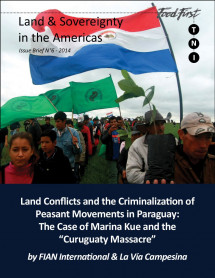Land Conflicts and the Criminalization of Peasant Movements in Paraguay The Case of Marina Kue and the “Curuguaty Massacre”
Topics
On June 15, 2012, seventeen people— farmers and police officers—were killed in Curuguaty, Paraguay. This report focuses on the enabling conditions in the land governance structure that allowed this massacre to take place, detailing a climate of violence and impunity, the absence of protections for small and landless farmers, and the use of state repression in the service of the country’s powerful landed elite.

Authors
On June 15, 2012, seventeen people—eleven peasant farmers and six police officers—were killed in the rural district of Curuguaty, Paraguay. Now known as the “Curuguaty massacre” the killings took place during a violent eviction carried out by police and prosecutors against families of landless peasants who had occupied a piece of land known as Marina Kue. The Curuguaty massacre is now recognized as one of the most serious cases of human rights violations and an emblematic example of the growing criminalization of peasant struggles for the right to land in Latin America
Paraguay is one of the countries with the most extreme land inequality in the world. According to the 2008 agriculture census, 2.6 percent of landowners hold 85.5 percent of Paraguay’s lands while 91.4 percent of small farmers—with properties smaller than twenty hectares—hold only six percent of the agricultural land. Combined with the high levels of violence and impunity surrounding the Curuguaty massacre, these facts indicate a severe lack of responsible land governance in Paraguay, the absence of protections for small and landless farmers, and the use of state repression in the service of the country’s powerful landed elite. Additionally, the criminal case brought against poor peasant farmers lays bear the rampant discrimination within Paraguay’s judicial system and Public Ministry.
In light of these circumstances, Paraguayan society, social movements and human rights organizations demand that the Paraguayan government:
- Carry out a thorough and impartial investigation of allegations of extra-judicial killings, arbitrary detentions, death threats, and physical and psychological torture of peasants during and after the forced eviction of June 15, 2012, in Marina Kue, Curuguaty.
- Carry out a process to clarify the land titles of Marina Kue and guarantee the implementation of the agrarian reform process.
- Put an end to violent evictions and the criminalization of social movements.
- Respect and protect the human rights of peasant and indigenous communities, including their right to life, food, land and a dignified livelihood.

